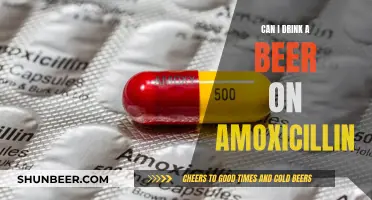
Drinking alcohol is a topic that has been widely discussed in Christianity. While some Christians advocate for total abstinence from alcohol, the Bible does not explicitly prohibit the consumption of beer, wine, or other alcoholic beverages. Instead, it emphasizes moderation and cautions against drunkenness. The Bible contains several references to alcohol, with some passages portraying it in a positive light, such as Ecclesiastes 9:7, which instructs believers to Drink your wine with a merry heart. The Bible also mentions instances of Jesus drinking wine, such as during the Last Supper, where he shared bread and wine with his disciples. However, it is important to note that drunkenness is considered a sin in Christianity, and Christians are advised to avoid losing control and being enslaved by alcohol.
| Characteristics | Values |
|---|---|
| Drinking alcohol | Not a sin |
| Drinking alcohol in moderation | A blessing |
| Drinking alcohol to excess | A sin |
| Drunkenness | A sin |
| Drinking alcohol and causing offence to other Christians | A sin |
| Drinking alcohol and causing others to sin against their conscience | A sin |
| Drinking alcohol and losing control | A sin |
| Drinking alcohol and being enslaved by it | A sin |
| Drinking alcohol and being filled with the Holy Spirit | Not a sin |
What You'll Learn

Drinking alcohol is not a sin for Christians
The Bible does, however, warn against drunkenness and addiction to alcohol. Ephesians 5:18 advises Christians to "not get drunk with wine, for that is debauchery, but be filled with the Spirit." The Bible also instructs Christians not to allow their bodies to be "mastered" by anything (1 Corinthians 6:12; 2 Peter 2:19).
The distinction between drinking alcohol and drunkenness is crucial. While drinking alcohol in moderation is not considered a sin, drunkenness is condemned in the Bible as it can lead to sinful behavior and poor judgment. Christians are called to exercise self-control and avoid excess, honoring God with their decisions and actions.
It is worth noting that views on alcohol consumption vary among Christian denominations. Some Christians choose to abstain from alcohol completely, while others consume it in moderation. Ultimately, the decision to drink alcohol or not is a personal choice guided by an individual's faith and values.
Beer and Zantac: Safe Mix or Health Risk?
You may want to see also

Drunkenness is a sin
While drinking alcohol is not a sin for Christians, drunkenness is. The Bible does not forbid Christians from drinking beer, wine, or any other drink containing alcohol. In fact, some Bible passages discuss alcohol in positive terms. Ecclesiastes 9:7 instructs Christians to "Drink your wine with a merry heart", and the Psalmist says that God gives wine "to gladden the heart of man" (Psalm 104:14-15). In the New Testament, Jesus drank wine, and he also turned water into wine at a wedding in Cana (John 2:1-11).
However, drunkenness is a sin. The Bible condemns drunkenness and being enslaved to wine (Ephesians 5:18; Titus 2:3). The apostle Paul repeatedly warns against drunkenness. He admonished members of the church at Corinth not to keep fellowship with a member who is a drunkard (1 Corinthians 5:11). He also instructed Christians to avoid allowing their bodies to be "mastered" by anything (1 Corinthians 6:12; 2 Peter 2:19). Drunkenness ruins lives (Proverbs 23:20-21), and God's judgment is on the drunkard (Isaiah 5:11, 22). Drunkards are considered unbelievers in the Bible (1 Corinthians 6:9-10; Galatians 5:21; 1 Peter 4:3; Romans 13:13; Luke 21:34; Isaiah 28:1).
The Bible's teaching on drunkenness is clear: it is a sin. However, this does not mean that Christians must abstain from alcohol completely. The Bible teaches that drinking in moderation is acceptable (1 Corinthians 10:31). Alcohol, consumed in small quantities, is neither harmful nor addictive for most people. However, due to the potential for abuse and the possibility of causing another Christian to stumble, it is often best for a Christian to abstain from drinking alcohol (Romans 14:21).
Understanding Beer Screens: The Science Behind the Suds
You may want to see also

Alcohol can be a blessing
Firstly, alcohol is a gift from God, and it can be used to celebrate and enhance social occasions. Ecclesiastes 9:7 instructs Christians to "drink your wine with a merry heart". The Psalmist says that God gives "wine to gladden the heart of man" (Psalm 104:14-15). Friends can enhance their gatherings by sharing drinks, and alcohol can encourage relaxation, happiness, and laughter. These are all blessings from God.
Secondly, alcohol can be used for medicinal purposes. "Give strong drink to the one who is perishing, and wine to those in bitter distress" (Proverbs 31:61, 1 Tim. 5:23). In the past, alcohol was used as a painkiller and to prevent infection.
Thirdly, alcohol is used in religious observances. In the Old Testament, God's people, Israel, were commanded to include drink offerings of wine with the burnt offerings they made to God (e.g. Num. 15:5, 7, 10). Wine was among the blessings for which the Israelites paid tithes and gave offerings to their Creator (Neh. 10:39, 13:5).
Finally, the Bible also depicts drunkenness as a sin, and Christians are forbidden to get drunk. "Do not get drunk with wine, for that is debauchery, but be filled with the Spirit" (Ephesians 5:18).
In conclusion, alcohol can be a blessing from God when used in moderation and with caution. It can enhance social occasions, provide medicinal benefits, and be used in religious observances. However, drunkenness is a sin, and Christians must be careful not to abuse the gift of alcohol.
Beer and Vinegar: A Safe Mix?
You may want to see also

Alcoholism is dangerous
Drinking alcohol is not a sin for Christians, and Jesus himself drank wine. However, drunkenness is a sin, and alcoholism is dangerous. Alcoholism can have a direct impact on the way the brain functions, causing short-term difficulties with communication and coordination, and long-term destruction of brain cells and shrinking of the frontal lobes, which impairs thinking skills. It can also lead to dramatic changes in mood and behaviour. Alcoholism can also cause damage to the heart, as heavy drinking can lead to high blood pressure, which in turn can cause heart disease. This damage can be reversed with successful alcoholism treatment.
The pancreas is also affected by alcohol consumption, as it begins to produce toxins that can lead to pancreatitis, a serious inflammation and swelling of the blood vessels in the pancreas. Heavy drinking can also increase the risk of mouth, oesophagus, throat, liver and breast cancer. As the liver is responsible for breaking down and metabolising alcohol, it can be damaged by long-term use, leading to severe liver inflammation (alcoholic hepatitis) or liver scarring (cirrhosis). Liver diseases caused by alcohol can be fatal.
Alcoholism can weaken the body's immune system, making alcoholics more susceptible to conditions like pneumonia and tuberculosis. It can also cause learning and memory problems, impaired driving, unintentional injuries, violence, unsafe sexual behaviour, suicide attempts, overdoses, and addiction. Binge drinking, defined as consuming four drinks for women and five drinks for men in about two hours, can increase the risk of chronic diseases such as high blood pressure, heart disease, and liver disease, as well as memory and learning problems, sexually transmitted diseases, and unintentional injuries.
The Process of Canning Beer: A Step-by-Step Guide
You may want to see also

Drinking alcohol in moderation is acceptable
Jesus drank wine during his time on earth. Religious leaders accused him of being a drunkard, but he never got drunk (Luke 7:34). Jesus also turned water into wine at a party (John 2:1-11), and it was customary for him to enjoy a drink with his friends. It was also a tradition for Jews to drink wine at the yearly Passover meal, in which Jesus participated. He also instituted the Lord's Supper with bread and wine (Luke 22:14-20).
The Bible also acknowledges the medicinal value of wine (Proverbs 31:61, 1 Tim. 5:23). In the past, alcohol was used to provide relief from pain. In addition, the Bible mentions the positive aspects of wine, depicting it as a blessing from God that can make life more enjoyable (Psalm 104:14-15; Ecclesiastes 3:13; 9:7).
However, Christians who choose to drink alcohol should do so in moderation. Drunkenness and addiction to alcohol are sins that Christians must refrain from (Ephesians 5:18; 1 Corinthians 6:12). The Bible gives several reasons to avoid overdrinking, including impaired thinking ability, the removal of inhibitions, and the potential to lead to poverty and serious health problems (Proverbs 23:20-21, 29-35; Hosea 4:11; Ephesians 5:18).
In conclusion, while drinking alcohol is not inherently sinful for Christians, it is important to do so in moderation and not to the point of drunkenness or addiction.
The Beer Bug Mystery: How Does It Work?
You may want to see also
Frequently asked questions
Drinking alcohol is not considered a sin for Christians. In fact, Jesus drank wine and turned water into wine at a party. However, drinking in excess and becoming drunk is considered sinful.
The Bible does not forbid Christians from drinking alcohol. While it stresses the importance of avoiding drunkenness, it also mentions alcohol in a positive light, such as when it encourages people to drink wine with a merry heart.
Yes, Christians can drink beer as long as they do so in moderation and do not become drunk. Beer is included in the alcoholic drinks that are mentioned in the Bible and encouraged to be consumed in moderation.
Some Christians choose to drink beer or other alcoholic beverages as a form of social drinking, especially in evangelical circles and among young adults. They believe it is not a sin as long as it is consumed in moderation and does not lead to drunkenness.
While some Christians may worry that drinking alcohol will ruin their testimony, others argue that it can actually help break down wrong assumptions about Christianity and allow them to connect with non-believers. Ultimately, it is about using wisdom and caution when consuming alcohol and ensuring that it does not become an idol or cause stumbling blocks for others.







